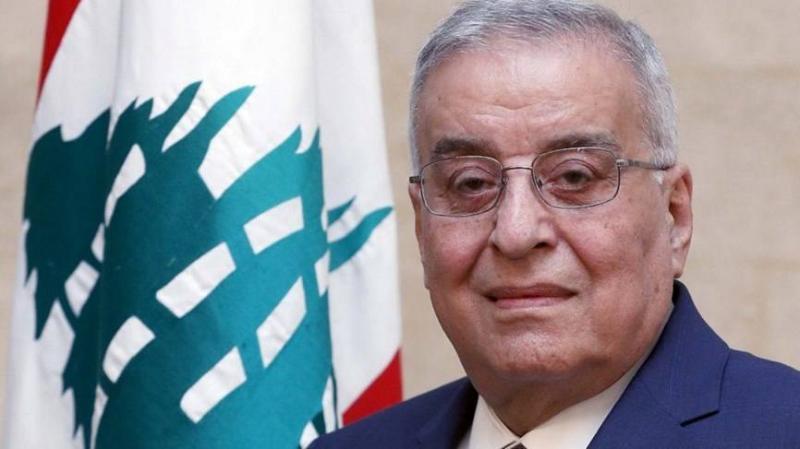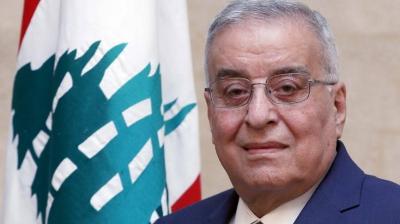The Lebanese Cabinet's reluctance to include the statement issued by Foreign Minister and Emigrants Abdullah Bou Habib regarding Russia's invasion of Ukrainian territory on the agenda of its meeting held the day before yesterday adds a layer of ambiguity to Lebanon's stance. Despite this, Bou Habib decided to shoulder the negative feedback stemming from the statement, stating: "I am wearing a shield, shoot me for the statement," claiming there was no room to expose state secrets that should remain confidential. This stance has confused most ministers, particularly those who publicly criticized the statement, albeit timidly, for deviating from neutrality and Lebanon's policy of distancing itself from the regional power struggles.
Bou Habib's insistence on bearing alone the consequences of his statement, which resulted in Moscow's displeasure—a sentiment conveyed by Lebanon's Ambassador to Russia, Chawki Bou Nasar, from Russian Deputy Foreign Minister Mikhail Bogdanov, and also from the Russian Ambassador to Lebanon—does not fulfill the required objective or appease the Russian leadership through communications initiated by several Lebanese officials with Russian administration officials, led by Bogdanov.
Sources close to Lebanese decision-making circles informed "Asharq Al-Awsat" that Bou Habib chose to independently carry the burden caused by the Foreign Ministry's statement and positioned himself as the one willing to sacrifice to divert attention from the adverse consequences of the statement, which included phrases that, at best, can be described as transcending established diplomatic norms when addressing foreign ministries of sister or friendly countries.
The same sources revealed that Bou Habib was left alone to "pick his thorns," even as a comparison of the draft statement he personally prepared with the content of the final version quickly uncovers a "hidden stitch" that allowed those wishing to protect him to intervene and modify the text to include severe language against Moscow, language that had not been articulated by senior European officials who have steadfastly opposed Russia's invasion of Ukrainian territory.
The sources noted that it is unprecedented for a Foreign Minister to use such sharp language in ministry statements, especially from such a seasoned diplomat, and questioned why those who abandoned him when criticism intensified did not opt to support him, even in a token gesture of solidarity to absorb the backlash. They also questioned whether Bou Habib had the audacity to issue the statement on behalf of the Foreign Ministry without consulting those at the helm of state, especially since an immediate comparison of his statement and that delivered by Lebanon's permanent representative to the United Nations, Ambassador Amal Mudallali, regarding Lebanon's stance on the Russian invasion reveals a profound contradiction between the two statements, although Bou Habib had instructed her and was in constant consultation with her.
It was noted that a simple comparison would raise disbelief regarding Bou Habib's use of two voices and that there were attempts behind the scenes to communicate with Moscow in a bid to mend fences and reduce its displeasure. The same sources asserted that "Hezbollah" had entered the fray regarding Bou Habib's statement, either through its affiliated Minister of Labor Mustafa Berham or the deputies Hassan Fadlallah and Ibrahim al-Mousawi, striving to articulate a position entirely contrary to the Foreign Ministry's statement under the banner that it deviated from Lebanon's neutrality and marked a breach of the government’s policy of self-distancing.
"Hezbollah" either forgot or overlooked, as an opposition source told "Asharq Al-Awsat," that it has continuously resisted ministerial statements from successive governments committed to neutralizing Lebanon from the surrounding fires in the region and refraining from interference in the affairs of nations, which has led to a deterioration of Lebanese-Arab relations, particularly with the Gulf states. Efforts spearheaded by Prime Minister Najib Mikati’s government to rebuild trust with Gulf states have been unsuccessful, despite presenting a series of proposals in response to a paper carried by Kuwaiti Foreign Minister Ahmed Nasser Al-Mohammad Al-Sabah representing Arab, Gulf, and international communities to Lebanon aimed at mending relations and extracting them from the ongoing crisis.
The opposition source questioned how "Hezbollah" reconciles opposing forces under one roof, particularly as it claims neutrality regarding the Russian invasion but contradicts this in all matters concerning Lebanon's Arab relations. They stated that the party follows selective and arbitrary approaches in framing the broader political context for self-distancing and neutrality.
This observation also applies to the President of the "Free Patriotic Movement," Deputy Gebran Bassil, who reached out to the Russian Ambassador to Lebanon to convey that he bears no relation to Bou Habib's statement, closely associated with President Michel Aoun, thus reaffirming his adherence to Lebanon's neutrality and policy of self-distancing—even though he has a history of providing political cover for his ally "Hezbollah" in its interference in Lebanon's relations with Gulf states, and in providing unabashed support for the axis of resistance led by Iran. Otherwise, why did he not respond when the party threatened the investigating judge in the Beirut port explosion, Judge Tarek Bitar, or when Secretary-General Hassan Nasrallah stated that the party has more than 100,000 fighters?
Bassil did not stop at disassociating himself from Bou Habib's statement; he also decided to send his advisor for Russian affairs, former deputy Amal Abu Zeid, to Moscow to meet Bogdanov on a special mission that extends beyond an apology to arrange his status to serve his presidential aspirations, notwithstanding that he had been behind the deterioration of Lebanese-Arab relations during his tenure as Foreign Minister.
Therefore, the government hopes that Moscow will respond positively to Mikati's desire to put behind it the negative repercussions stemming from Bou Habib's statement and consider it a thing of the past. This has placed the Foreign Minister in the "dock" for deteriorating Lebanese-Russian relations, even though he is, as they say, "with water in his mouth," because someone altered the statement contrary to the draft he prepared, while the decision was made to withdraw it from circulation during the cabinet meeting, although a very few ministers wanted to express dissenting views, without these ministers receiving any defense, even in a perfunctory manner.
Consequently, will secrecy continue to surround the entity that introduced changes to Bou Habib's statement that were imposed upon him, diverging from the draft he prepared? Or is he keen on keeping state secrets away from the spotlight? Although there is no longer a secret after he selflessly took on the responsibility, sources confirm that there are those who abandoned him while choosing not to delve into the details.




